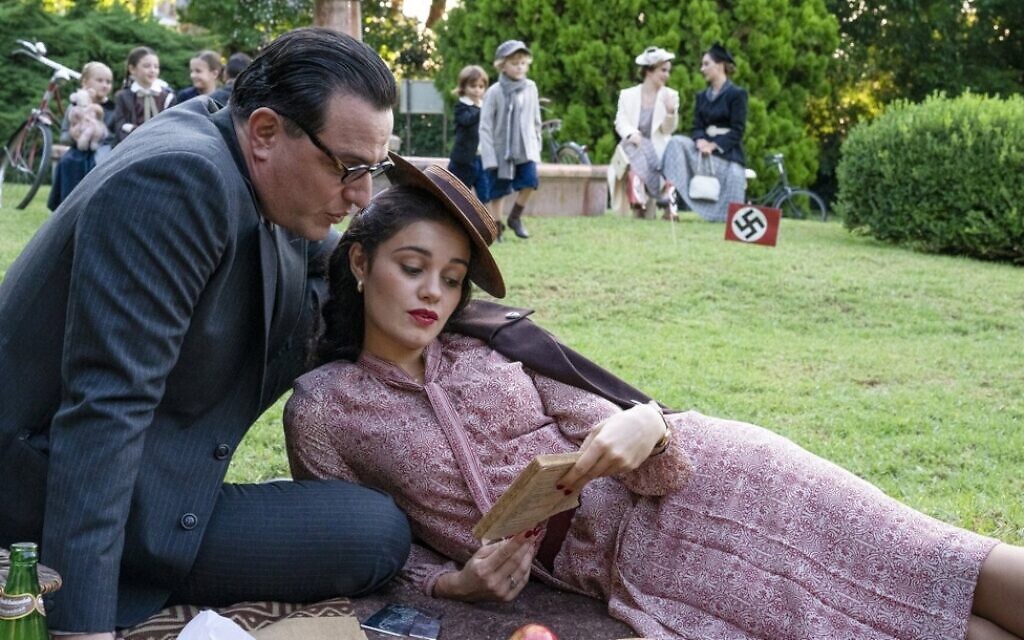
[ad_1]
JTA – A historic drama series that debuted in Brazil on Sunday was supposed to belatedly recognize a woman nicknamed “the Angel of Hamburg” for her actions during the Holocaust.
Entitled “Passports to Freedom,” the show produced by South American media giant Globo and Sony Pictures dramatically amplified the little-known story of Aracy de Carvalho, who rescued several Jews while working at the consulate in Canada. Brazil in Hamburg until 1942.
But two respected Brazilian historians are calling the story an exaggeration, claiming that de Carvalho followed orders while at the consulate, incurring little or no personal risk by issuing standard visas to German Jews who escaped.
As a consulate employee, de Carvalho helped at least five Jewish families flee in 1938-1939, facilitating their departure to Brazil, according to her file at Israel’s Yad Vashem Holocaust Museum. In 1982, the museum recognized her as Righteous Among the Nations – a title for non-Jews who risked their lives to save Jews. She died in 2011.
Historians Fábio Koifman and Rui Afonso questioned his claim to the title in a book published this year titled “Jews in Brazil: History and Historiographyâ€.
In interviews in the days leading up to the TV series’ release, the couple sparked debate in Brazilian media over their legacy. De Carvalho had not spoken much of the actions attributed to him during his lifetime, but has received increasing recognition in recent years.
“The evidence shows that there was no heroine in this story,” Koifman told the Portuguese-language edition of the BBC website this week. The fanfare around de Carvalho’s actions is part of a “creation of a myth,” according to the OUL news site, citing Koifman.
Koifman told the BBC that de Carvalho did not have the authority to issue visas, none of which bore his name or signature. Those issued show no signs of tampering and were distributed in accordance with official Brazilian policy. All visas were signed by the consul, Joaquim Antônio de Souza Ribeiro, or his deputy, João Guimarães Rosa, who met de Carvalho at the consulate and later married her.
All visas were issued under the Brazilian government’s restrictive visa policy, historians wrote.
A Yad Vashem security officer in the empty Hall of Names at the Yad Vashem Holocaust Memorial Museum in Jerusalem, April 19, 2020 (Yonatan Sindel / Flash90)
Like many other countries, Brazil introduced immigration restrictions that seemed designed to block the heavily Jewish flow of refugees from Europe. According to some historians, the Brazilian authorities were particularly discriminatory towards future Jewish immigrants.
In the 1930s, the Brazilian government required applicants to deposit a large sum of money in its national bank in order to enter. This excluded many Eastern European Jews living in poverty, as well as many German Jews whose property had previously been stolen by the Nazis.
De Carvalho was involved in obtaining several tourist visas for Jews who fled Germany. Visas were instrumental in their leaks, but historians argue that de Carvalho acted as his government intended, with little personal risk.

A message for Yom Hashoah, or Holocaust Remembrance Day, is lasered onto the buildings of the National Congress in Brasilia, Brazil on April 11, 2018 (Roque de Sa / Agencia Senado via Fotos Publicas)
“You could say there was goodwill or some other motive behind the issuance of these visas, but there is no evidence that this is the case,†Koifman and Afonso wrote in their book.
Rumors that de Carvalho removed the letter J from the applicants’ German passports were just that, historians wrote. “All passports contained a J,†Koifman told the BBC.
Several people helped by Carvalho testified of her actions to Yad Vashem, who relied on these testimonies to recognize her as Righteous among the nations. But visas issued to those people, including a woman named Margarethe Levy mentioned in Yad Vashem’s file on de Carvalho, show no improper action on the part of the consulate, historians wrote. They characterize Yad Vashem’s recognition of Carvalho as a Righteous Among the Nation a mistake.
“These situations, where myths are created, occur when memory does not correlate with history,†they write in their book.
The show’s creators have defended his story.
“We have access to countless testimonies from descendants of survivors who spoke with great emotion about what they had heard from their parents, grandparents and great-grandparents,” Mario Teixeira told OUL. He also cited the “very extensive research done†by Yad Vashem.
Yad Vashem did not immediately respond to a request for comment on the issues raised by Koifman and Afonso.
[ad_2]